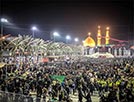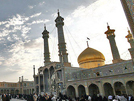10-Peace In Islam
- Details
- Hits: 3759
10-PEACE IN ISLAM
Question:
Is Islam a religion of peace or a religion of war?
Answer:
Islam is a religion of peace and not of war and the proof of this are God’s words in the Qur’an: “O you who believe, enter all of you into peace”[2: 208], also “And if they are disposed towards peace, you, also, be so disposed”[8: 61].
Question:
So does Islam say you must submit when confronted with an oppressor or aggressor?
Answer:
Certainly not, for Islam is a religion of reason and justice and therefore submission and capitulation are not permissible and thus God says: “... whoever then acts aggressively against you, inflict aggression upon him in the same way that he had inflicted it upon you”[2: 194]; and says:
“Permission [to retaliate] is given to those upon whom war is made because they are oppressed, and most surely God is able to grant them victory”[22: 39]; God also says:
“And if you retaliate, then do so in the same way that you were treated”[16: 126].
Question:
If Islam is the religion of peace, then why did it consider fighting non-Muslims to be permissible and why did the Prophet of Islam fight them?
Answer:
All the battles of the Prophet (God’s blessings and peace be upon him and his progeny) are characterized by their having been defensive battles and not battles of aggression. He did not fight because he loved power for its own sake or because he wanted to acquire territory and colonize it.
Question:
Does Islam ever consider starting fighting to be lawful?
Answer:
Yes, but only under two conditions:
1. If the fighting is for the sake of God in order to deliver people from harmful beliefs and defiled social and moral practices.
2. If it is for the sake of the downtrodden: to deliver people who are suffering from suppression and tyranny at the hands of tyrants and oppressors.
These two principles have been enunciated in the Holy Qur’an thus:
“And what prevents you from fighting for the sake of God and for the oppressed men, women, and children?”[4: 75].
Question:
In brief, what are the differences between an Islamic war and a non- Islamic one?
Answer:
They can be summed up as follows:
1-Islam fights only for the deliverance of human beings:
a) Delivering men from superstitious, dangerous beliefs, corrupt behaviour and saving the oppressed from those who exploit them
b) To ward off attack, be it from abroad or from a rebellion against Islam from within.
2-Islam, if it engages in conflict observes the strictest ethical conduct:
a) It does not harm women, children, those who are not involved in the conflict, old men, and similar categories of non-combatants.
b) It does not cut off the supply of water or poison it, cut down trees, and so on.
c) As far as possible, it refrains from killing.
d) After gaining the upper-hand it grants a general amnesty, just as the Holy Prophet (God’s blessings and peace be upon him and his progeny) did in the case of the people of Makka and ‘Ali (peace be upon him) did with the inhabitants of Basra.
3-Exemplary behaviour after victory:
a) Applying justice everywhere scrupulously.
b) Islam does not exploit the country but enables the inhabitants to benefit from its resources.
c) Does not impose from outside a ruler over the people but instead enables someone from the indigenous populace to rule the country if he possesses the necessary qualities.
d) Gives complete freedom and equality to the people, as has already been indicated.
As for non-Islamic conflicts, they are not waged to save people from their plight but rather to gain control over them. The victors after gaining power are set on a policy of killing, exploitation and oppression.
What we have said regarding wars waged in the name of Islam and non-Islamic conflicts is not mere propaganda but is substantiated by history. We should add that those wars and battles carried out in the name of Islam but which, however, do not conform to the Islamic principles outlined above, are to be considered aberrations.











